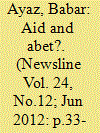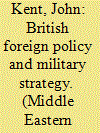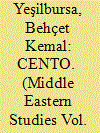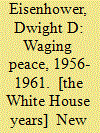|
|
|
Sort Order |
|
|
|
Items / Page
|
|
|
|
|
|
|
| Srl | Item |
| 1 |
ID:
113503


|
|
|
| 2 |
ID:
174172


|
|
|
|
|
| Summary/Abstract |
The post-war contradiction between British foreign policy aiming to become a third world power through Europe and the ‘middle of the planet’, and military strategy focused exclusively on an imperial Middle East presence, began to change in 1949. With reduced military resources only the power of prestige (what the rest of the world thinks of Britain) remained. However, by now exacerbating the contradiction between different Middle Eastern foreign policy goals, the Baghdad Pact, having little to do with countering external threats, produced internal conflicts out of its contradictions. Maintaining British middle eastern prestige became crucial just as it was threatened by the US, (disturbed by the imperial problems left by the British, particularly in Egypt) seeking to construct defence arrangements on the Northern Tier. The Baghdad Pact maintained different but equally false claims that a British military presence was necessary to ensure the defence of the Middle East from the Soviet Union. As Anglo-American relations became ones of ‘competitive cooperation’, the military adapted strategy to political needs. Bases for largely non-existent forces, and deceitfully planning to fight a war with nuclear weapons Britain could not deploy were desperate measures to impress middle eastern allies and avoid losing more prestige. The Arab rivalries and divisions the Baghdad Pact exacerbated were eventually to result in Britain becoming involved in military conflict, putting its prestige and influence on the line with more deceit and disastrous consequences for its Middle East influence.
|
|
|
|
|
|
|
|
|
|
|
|
|
|
|
|
| 3 |
ID:
177270


|
|
|
|
|
| Summary/Abstract |
This article sets out to explore the formation of the Central Treaty Organisation (CENTO), 1959-1979. It seeks to determine the aims with which CENTO was established, its failings, and the struggle that was undertaken against it by hostile countries. It examines the events surrounding its formation, development and collapse, and Anglo-American attempts to contain the Soviet Union in the Middle East. It also deals with British and American post-war defence policies in the Middle East and their collective defence projects in the region, such as the Middle East Command, the Northern Tier and Baghdad Pact, which led to CENTO. In addition, it looks at the policies of the local members and the organisation’s internal structure. It poses questions of how the members of CENTO perceived the question of Middle East defence, what their basic aims were, and what problems they faced while trying to achieve these aims and implementing their chosen solutions. CENTO had its genesis in the Pact of Mutual Cooperation signed by Turkey and Iraq in Baghdad on 24 February 1955. Britain joined the Baghdad Pact on 5 April 1955, followed by Pakistan on 23 September and Iran on 3 November of the same year. While the United States strongly supported the creation of the Pact, for purely technical reasons of budgeting procedures, it never took up formal membership. On 14 July 1958, there was a military coup in Iraq, led by Brigadier Kassem, in which King Faisal, the Crown Prince, and the Prime Minister, Nuri Said, were all murdered. The new military regime did not immediately withdraw from membership, but it no longer participated in the work of the alliance. For the Baghdad Pact as a whole, the result was serious but not fatal. In October 1958, the Pact headquarters was moved from Baghdad to Ankara. On 24 March 1959, Kassem withdrew Iraq from the alliance and on 19 August 1959, it was announced in Ankara that the name had been changed from the ‘Baghdad Pact’ to the ‘Central Treaty Organisation’, abbreviated as CENTO. The membership remained unchanged: namely Turkey, Iran, Pakistan and Britain, with the US as a full participant. CENTO survived until 1979 when Iran withdrew from CENTO on 11 March following the Islamic revolution, claiming that ‘it only protected interests of the imperialist states’. Pakistan followed suit on 12 March, because it believed that ‘the organisation was not able to protect Pakistan’s security’; and the next day Turkey proclaimed that ‘CENTO had in effect lost its function in the region’. The history of CENTO has not so far been extensively researched and, as a result, the formation of CENTO and its overall aims are still surrounded by controversy. There are no comprehensive studies on the subject, though general information is given in a number of scholarly works. This article is based upon a range of primary and secondary sources. Much of material for this study was gathered from the National Archives, the United Kingdom.
|
|
|
|
|
|
|
|
|
|
|
|
|
|
|
|
| 4 |
ID:
152607


|
|
|
|
|
| Summary/Abstract |
The aim of this article is to address the impact of the Baghdad Pact and the Anglo-American defense system and its collapse on the Turkish–Israeli relationship from 1954 to 1958, a discussion that is absent from scholarly studies. The article will highlight the different approaches and views of the two parties and their impact on the cold war alliances and the Arab–Israeli conflict. Examining this from the perspectives of both Ankara and Jerusalem will contribute to a comprehensive study of the bilateral relations during the 1950s. Some of the main questions to be addressed are: to what extent, if at all, did the Baghdad Pact change bilateral relations between Turkey and Israel? What were Israel's main concerns? Were its suspicions of Turkey's changing policy founded? How much was Turkey influenced by Iraq's membership of the Pact and its hostile attitude toward Israel? Was Turkey's attempt to maintain reasonable relations with both Israel and Iraq a realistic aim? All these will be assessed against regional upheavals and the cold war politics with current implications.
|
|
|
|
|
|
|
|
|
|
|
|
|
|
|
|
| 5 |
ID:
040500


|
|
|
|
|
| Publication |
New York, Doubleday and company, Inc., 1965.
|
| Description |
xxiii, 741p.Hbk
|
|
|
|
|
|
|
|
|
|
|
|
Copies: C:1/I:0,R:0,Q:0
Circulation
| Accession# | Call# | Current Location | Status | Policy | Location |
| 002007 | 923.173/EIS 002007 | Main | On Shelf | General | |
|
|
|
|
|
|
|
|
|